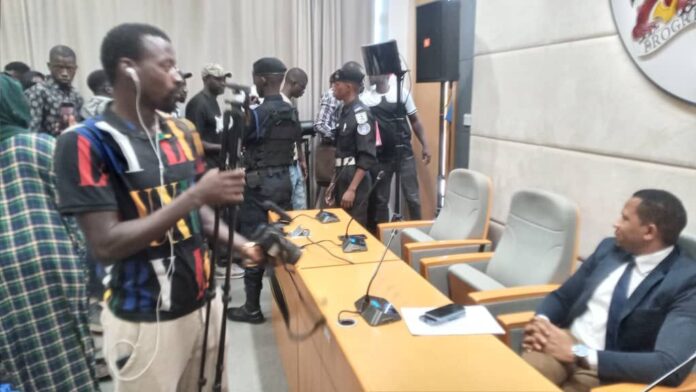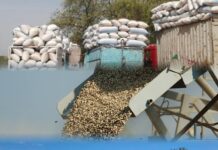By Alieu Ceesay
A government press conference meant to foster dialogue and optimism turned contentious on Tuesday, April 8. Victims of the recent Salagi demolition exercise walked out in frustration, decrying the lack of clear answers about their demolished homes. The Sir Dawda Kairaba Jawara International Conference Centre event in Bijilo exposed deep-seated anger among affected residents and underscored tensions over land rights in The Gambia.
The press conference, part of the government initiative to engage media and citizens on national achievements and challenges, took a dramatic turn when Salagi residents—whose homes were razed by the Ministry of Lands, Local Government, and Physical Planning—stormed out before its conclusion. The walkout highlighted their dissatisfaction with what they described as vague and inadequate responses from authorities.
Mariama Bojang, a single mother whose life savings vanished with her demolished home, voiced her anguish to the gathered crowd. “This is not clear; we are not happy at all. I have been struggling for four years to build my home. No one ever came to me and told me the land was government property or that I should not build my house there. I spent more than nine hundred thousand dalasis on that building. This is very painful,” she said, her words reverberating through the iconic conference center. Bojang’s D900,000 home, nestled in the quiet Salagi neighborhood, was reduced to rubble, leaving her family’s future uncertain.
Other victims joined her in protest, accusing the democratically elected government of unfairness and betrayal. Muhammed Morro Bojang, one of the oldest affected residents, demanded restitution in an emotional sideline interview with The Alkamba Times (TAT). “We want our lands back,” he declared, his frustration erupting as Deputy Permanent Secretary Momodou Taal of the Ministry of Lands and Local Government presented the official findings on the Salagi demolitions.
Taal defended the government’s actions, asserting that multiple steps had been taken to address illegal developments. “The Ministry of Lands, through its technical departments, have made several interventions to curb these illegal developments from the time of their inception through dialogue with the traditional lands’ owners, field inspections to stop the illegal developments, execution of demolitions on encroachments, press conferences, and sensitization,” he stated. Yet, these assurances did little to pacify the victims, many of whom claimed they had legally acquired their properties through Physical Planning—ironically, the same entity now overseeing the demolitions.
Critics pointed to a lack of early enforcement, noting that state security resources available to the Ministry and Physical Planning could have prevented public land construction before they progressed. “The real issue is the lack of commitment to stop these developments at the start,” one attendee remarked.
Amadou Daffeh, Deputy Director of the Department of Physical Planning and Housing, sought to bridge the gap, urging victims to engage directly with his office. “To come forward to Physical Planning,” he said, extending an invitation to those affected. Daffeh also warned that additional layouts nationwide are slated for demolition based on the department’s final reports, signaling more upheaval.
Amid the unrest, Information Minister Dr. Ismaila Ceesay shifted focus to upcoming government initiatives, announcing that President Adama Barrow would soon tour project sites, including roadsides in Bandi Salikene, Hakalan, Farafenni Border Post, and Sandi. For the Salagi victims, however, such promises offered little solace as they grappled with the immediate loss of their homes and security.
The walkout marked a striking moment in the government’s outreach efforts, laying bare the rift between officials and citizens over accountability and trust. As the voices of Mariama Bojang, Muhammed Morro Bojang, and others linger, the Salagi demolition crisis remains a poignant call for justice and resolution.






